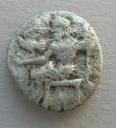Excavations on Mount Lykaion, the birthplace of Zeus, have uncovered pottery that long predates the arrivals of the Greeks and their deity, suggesting that the altar was let’s just say repurposed at some point.
“Paganism is a language, and you suppose that other people worship your gods under the appropriate names in their language,” said Dowden, author of Zeus, one in a series of books on ancient gods.
“So if, as we suppose, the Greeks arrive in Greece at the beginning of the second millennium B.C., it is no surprise to see that their cult site goes back to the third millennium B.C.,” Dowden said in email.
“The cult sites of earlier inhabitants are still regarded as valid,” he said, “and when the language spoken eventually changes to Greek, so may the name of the god.
“There can be no doubt the Greeks brought ‘Zeus,’ the name, with them to Mount Lykaion. But you do tend to worship a sky and weather god on mountain peaks, and that’s doubtless what his predecessor (as we would view it) was.”
So at least the new boss was in the same business as the old one.

